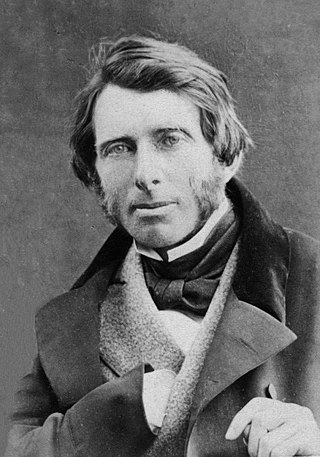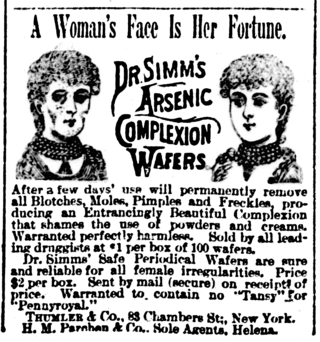Related Research Articles

Advertising is the practice and techniques employed to bring attention to a product or service. Advertising aims to present a product or service in terms of utility, advantages and qualities of interest to consumers. It is typically used to promote a specific good or service, but there are a wide range of uses, the most common being commercial advertisement.
Hanlon's razor is an adage or rule of thumb that states:

Mahogany is a straight-grained, reddish-brown timber of three tropical hardwood species of the genus Swietenia, indigenous to the Americas and part of the pantropical chinaberry family, Meliaceae. Mahogany is used commercially for a wide variety of goods, due to its coloring and durable nature. It is naturally found within the Americas, but has also been imported to plantations across Asia and Oceania. The mahogany trade may have begun as early as the 16th century and flourished in the 17th and 18th centuries. In certain countries, mahogany is considered an invasive species.

John Ruskin was an English writer, philosopher, art historian, art critic and polymath of the Victorian era. He wrote on subjects as varied as geology, architecture, myth, ornithology, literature, education, botany and political economy.
A grey market or dark market is the trade of a commodity through distribution channels that are not authorized by the original manufacturer or trade mark proprietor. Grey market products are products traded outside the authorized manufacturer's channel.

In rhetoric, a weasel word, or anonymous authority, is a word or phrase aimed at creating an impression that something specific and meaningful has been said, when in fact only a vague, ambiguous, or irrelevant claim has been communicated. The terms may be considered informal. Examples include the phrases "some people say", "it is thought", and "researchers believe". Using weasel words may allow one to later deny any specific meaning if the statement is challenged, because the statement was never specific in the first place. Weasel words can be a form of tergiversation and may be used in advertising, popular science, opinion pieces and political statements to mislead or disguise a biased view or unsubstantiated claim.
Google AdSense is a program run by Google through which website publishers in the Google Network of content sites serve text, images, video, or interactive media advertisements that are targeted to the site content and audience. These advertisements are administered, sorted, and maintained by Google. They can generate revenue on either a per-click or per-impression basis. Google beta-tested a cost-per-action service, but discontinued it in October 2008 in favor of a DoubleClick offering. In Q1 2014, Google earned US$3.4 billion, or 22% of total revenue, through Google AdSense. In 2021, more than 38 million websites used AdSense. It is a participant in the AdChoices program, so AdSense ads typically include the triangle-shaped AdChoices icon. This program also operates on HTTP cookies.

Marriage vows are promises each partner in a couple makes to the other during a wedding ceremony based upon Western Christian norms. They are not universal to marriage and not necessary in most legal jurisdictions. They are not even universal within Christian marriage, as Eastern Christians do not have marriage vows in their traditional wedding ceremonies.
JRT Pascal is an implementation of the Pascal programming language. It was available in the early 1980s on the CP/M operating system.
Unto This Last is an essay critical of economics by John Ruskin, who published the first chapter between August and December 1860 in the monthly journal Cornhill Magazine in four articles.

False advertising is the act of publishing, transmitting, or otherwise publicly circulating an advertisement containing a false claim, or statement, made intentionally to promote the sale of property, goods, or services. A false advertisement can be classified as deceptive if the advertiser deliberately misleads the consumer, rather than making an unintentional mistake. A number of governments use regulations to limit false advertising.

Value investing is an investment paradigm that involves buying securities that appear underpriced by some form of fundamental analysis. Modern value investing derives from the investment philosophy taught by Benjamin Graham and David Dodd at Columbia Business School starting in 1928 and subsequently developed in their 1934 text Security Analysis.

Sweet Briar College is a private women's liberal arts college in Sweet Briar, Amherst County, Virginia. It was established in 1901 by Indiana Fletcher Williams in memory of her deceased daughter, Daisy. The college formally opened its doors in 1906 and granted the B.A. degree for the first time in 1910. It nearly closed in 2015 but was saved by donations and legal actions by alumnae.

J.D. Power is an American data analytics, software, and consumer intelligence company founded in 1968. The company specializes in the use of big data, artificial intelligence, and algorithmic models examining consumer behavior. The firm's business model has evolved to emphasize data and analytics and software products. Industry benchmarking studies are used to evaluate detailed consumer interactions and trends across the automotive, financial services, healthcare, home, insurance, technology, media and telecom, travel and hospitality, senior living, and utilities industries.
An invitation to treat is a concept within contract law which comes from the Latin phrase invitatio ad offerendum, meaning "inviting an offer". According to Professor Andrew Burrows, an invitation to treat is
an expression of willingness to negotiate. A person making an invitation to treat does not intend to be bound as soon as it is accepted by the person to whom the statement is addressed.
Perfect is the enemy of good is an aphorism that means insistence on perfection often prevents implementation of good improvements. Achieving absolute perfection may be impossible; one should not let the struggle for perfection stand in the way of appreciating or executing on something that is imperfect but still of value.
DealDash is a bidding fee auction website. It was founded in 2009, and is headquartered in Minneapolis, Minnesota, United States.
2 Cheap Cars is a used car dealership group in New Zealand. It was founded in 2011 by Eugene Williams and Yusuke Sena. The company specialise in selling Japanese imported cars in New Zealand.
Bitcoin was designed by its pseudonymous inventor, Satoshi Nakamoto, to work as a currency, but its status as a currency is disputed. Economists define money as a store of value, a medium of exchange and a unit of account, and agree that bitcoin does not currently meet all these criteria.
Tekpix was a line of technology products from the Brazilian company Tecnomania. It became best known for its multifunctional cameras, which started being sold in the early 2000s, but stopped in 2013 due to the growing popularity of smartphones. The Tekpix TV announcer, "Juarez from Tekpix," became a meme for his catchphrases, such as "Let's talk about good things," and for claiming that the Tekpix was the best-selling camera in Brazil; however, this was never proven. The line also included an Android tablet, the i-TVWF7x-4.0, released in 2013. The products received negative reviews regarding low quality and high price, with several comparisons being made with other products of lower value and better quality by technology sites.
References
- ↑ Augustine, Norman R. (1997). Augustine's Laws. AIAA. ISBN 978-1-56347-240-4.
- ↑ Matters, United States Congress Senate Committee on Armed Services Task Force on Selected Defense Procurement (1985). Quality Control: Hearing Before the Task Force on Selected Defense Procurement Matters of the Committee on Armed Services, United States Senate, Ninety-eighth Congress, Second Session, October 18, 1984. U.S. Government Printing Office.
- 1 2 3 Fred R. Shapiro (2006). The Yale Book of Quotations. New Haven: Yale University Press. p. 657. ISBN 9780300107982 . Retrieved 7 January 2013.
- 1 2 3 Landow, George P. (27 July 2007). "A Ruskin Quotation?". VictorianWeb.org. Retrieved 7 January 2013.
- ↑ Ruskin Library (23 May 2011). "On the present economic situation". Ruskin Library. Archived from the original on 15 June 2013. Retrieved 28 January 2013.
- ↑ Bell, Kenneth J. (1992). "Go Figure--Some Reflections on John Ruskin, Bid Evaluation, and the Accidental Triumph of Good Engineering". Heat Transfer Engineering. 13 (4): 5. doi:10.1080/01457639208939784.
- ↑ Lewis C. Bowers; Sons, Inc. (9–15 March 1952). "Construction Costs". Town Topics. Princeton, NJ: Donald C. Stuart, Jr. and Dan D. Coyle. p. 11. Retrieved 2 January 2015.
- ↑ Plymouth Cordage, Co. (December 1913). "Mississippi River Improvements". Plymouth Products (21). Retrieved 7 January 2013.
- ↑ Anonymous. (August 1917). "Ain't it the Truth". Northwestern Druggist. 18 (8): 53. Retrieved 23 January 2013.
- ↑ Pittsburgh Reflector Co. Permaflector Lighting Catalog. Pittsburgh, Pa.: Pittsburgh Reflector Co. p. 3. Retrieved 2 January 2014.
- ↑ Art's Beauty Salon (1938). Sweet Briar YWCA (ed.). "Advertisement". Students' Handbook: Sweet Briar College. 1938–1939. Sweet Briar, Va.: Sweet Briar College: [ii]. Retrieved 2 January 2015.
- ↑ F.E.C. [F.E. Charles] (8 February 1933). "Progress of Kansas Press". Kansas Industrialist. 59 (17). Manhattan, Kansas: Kansas State College of Agriculture and Applied Science: 4. Retrieved 2 January 2015.
- ↑ Skoog, Jr., Charles V. (21 April 1958). "Advertising in the Barter Basement: Is Pitch More Potent than Payoff?" (PDF). Broadcasting: The Businessweekly of Television and Radio. Washington, DC: Broadcasting Publications, Inc.: 133. Retrieved 2 January 2015.
- ↑ Lehman Sprayshield Company (1938). Shower Bath Enclosures by Lehman. Philadelphia, Pa.: Lehman Sprayshield Company. p. 4. Retrieved 2 January 2015. "Don't You be the Goat". The Carleton. 10 (8). Ottawa, Ontario, Canada: Carleton College: 6. 12 October 1954. Retrieved 2 January 2015.Lamb, Geo[rge] N[ewton] (1940). How to Identify Genuine Mahogany and Avoid Substitutes. Chicago, Illinois: Mahogany Association, Inc. p. 24. Retrieved 2 January 2015.Shore High School (1934). The Log. Euclid, Ohio: Shore High School. p. 41. Retrieved 2 January 2014.Lamb, George N[ewton] (1947). The Mahogany Book (6th ed.). Chicago, Illinois: Mahogany Association, Inc. p. 47. Retrieved 2 January 2015.Woods, Baldwin M.; Raber, Benedict F. (March 1935). "Air Conditioning for California Homes". Bulletin. 589. Berkeley, Ca.: University of California, College of Agriculture, Agricultural Experiment Station: 43. Retrieved 2 January 2015.Charles T. Bainbridge's Sons (February 1965). "Advertisement". Today's Art. 13 (2). New York: Syndicate Magazines, Inc.: 3. Retrieved 2 January 2015.Greenkeepers Club of New England (February 1931). "Advertisers' Number" (PDF). Newsletter of the Greenkeepers Club of New England. 3 (2). Fall River, MA: Greenkeepers Club of New England: 2. Retrieved 12 March 2020.Pearson's Photographics (27 May 1949). "A Great Poet Once Said..." The Oxford Leader. Oxford Michigan. p. 10. Retrieved 12 March 2020.McColman, Richard (n.d.). "Telescopes: What the Buyer Needs to Know". Morehead Planetarium, University of North Carolina at Chapel Hill. Archived from the original on 3 February 2003. Retrieved 12 March 2020.Bluestein's (1948). "Quality". The Yellow Jacket, Yearbook of Thomas Jefferson High School. Port Arthur, TX: Thomas Jefferson High School. p. 181. Retrieved 12 March 2020.Bluestein's (1949). "Quality". The Yellow Jacket, Yearbook of Thomas Jefferson High School. Port Arthur, TX: Thomas Jefferson High School. p. 240. Retrieved 12 March 2020.Bluestein's (1950). "Quality". The Cardinal. Beaumont, TX: The Students of Lamar College. p. 127. Retrieved 12 March 2020.The Quarry (9 December 1934). "Brand---Quality---Price". The Michigan Daily. 45 (66). Ann Arbor, MI: University of Michigan. Retrieved 12 March 2020.Murphy, J. Palmer (16 December 1951). "Television Service Can Be Reliable". The Chronicle. XXIII (45). Paterson, NJ: The Chronicle Company: 5. Retrieved 12 March 2020.Mott, Elmer (September 1975). "Good 'n' Cheap!" (PDF). Weeds, Trees, and Turf. 14 (9). Harvest Publishing, Co.: 34. Retrieved 12 March 2020.
- ↑ Mariotti, John L. (2008). The Complexity Crisis: Why Too Many Products, Markets, and Customers Are Crippling Your Company and What to Do About It. Avon, Mass: Platinum Press. ISBN 9781605508535 . Retrieved 6 February 2013.
- ↑ Falcone, Marc (3 July 1973). "Paradise Lost Or, Baskin-Robbins Rated". New York. 6 (27). Retrieved 22 January 2013.
- ↑ North, Gary (August 1974). "Price Competition and Expanding Alternatives" (PDF). The Freeman. 24 (8): 467–476. Archived from the original (PDF) on 29 July 2013. Retrieved 23 January 2013.
- ↑ Philip, Bruce (2011). Consumer Republic: Using Brands to Get What You Want, Make Corporations Behave, and Maybe Even Save the World. Toronto: McClelland & Stewart. p. 141. ISBN 9780771070068 . Retrieved 1 February 2016.
- ↑ Garret, Jerry (3 May 2011). "Soapbox: There are more ways than one to skin a cat". Hi-Desert Star. Yucca Valley, CA. Retrieved 12 March 2020.